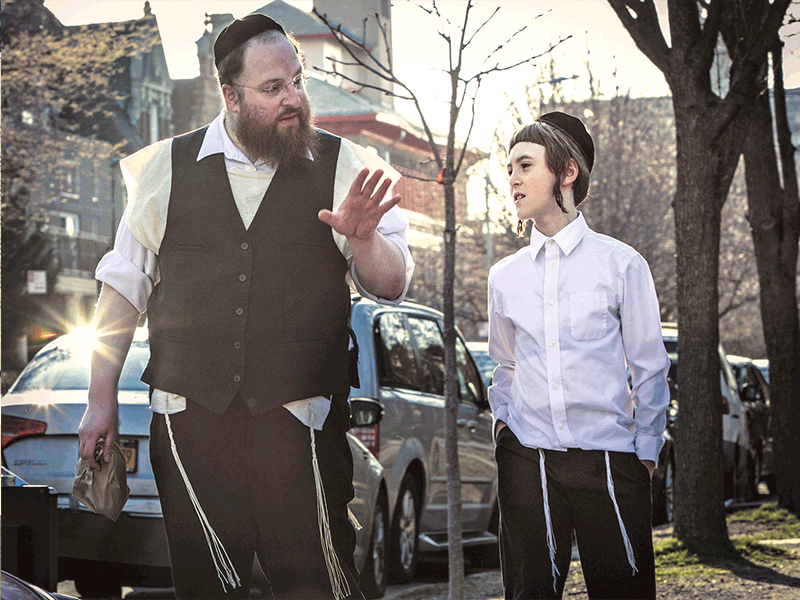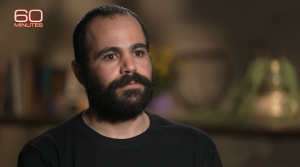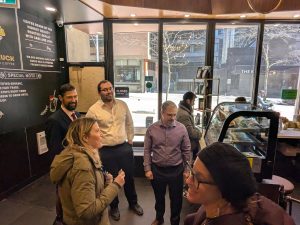Most directors making their first narrative feature wouldn’t choose to tell the story in a language they don’t speak fluently. Most filmmakers would also be careful not to work entirely with non-actors, or have 30 shooting days dispersed over a six-month period.
Joshua Z. Weinstein, however, conquered those challenges with his narrative debut, Menashe, a drama set within New York’s ultra-Orthodox community. The film opens in Toronto, Vancouver and Montreal on Aug. 11, before moving to other cities across Canada later in the summer.
“It was basically impossible to make,” Weinstein told The CJN in Toronto, the morning after the film played to a full house of around 700 at the city’s Jewish Film Festival.
“There are infinite ways where one component would have fallen apart and the whole thing would have been destroyed.”
The drama follows Menashe (played by Menashe Lustig), a widowed chassidic man trying to reconnect with his young son, Rieven (played by Ruben Niborski).
Menashe is also struggling in other areas of his life: he spars with the manager at the grocery where he works and fails to engage any of the women with whom he is set up.
READ: MENASHE EXECUTIVE DIRECTOR TALKS ABOUT FILM’S MAKING
Weinstein, a New York-based documentarian, says the film’s story came directly from Lustig’s experiences. But it was also the man’s spirit and naturalism on camera that helped the director decide that he would be the film’s focus.
“Menashe had these sad eyes and deep sorrow, but he also had this Charlie Chapin-esque persona,” Weinstein says. “When we cast Ruben a few months later … (when) I saw Menashe look at him like he was his real son, I was just overwhelmed with emotion.”
Lustig lives in New Square, a small, exclusively Skverer chassidic community north of New York City. The place is named after the Ukrainian town where this ultra-Orthodox sect originated.
“It was amazing being there, just seeing life that didn’t seem too dissimilar to where my family was from in Poland,” Weinstein says.
Keeping matters even more authentic, Menashe is entirely in Yiddish, a language rarely heard on the big screen.
“It would be dishonest to do (the film) in any other language,” Weinstein says, adding that it helped the ultra-Orthodox participants be more spontaneous while reading their lines.
It was also a challenge to find actors, since some religious leaders have strict rules banning the consumption of films and other media. It helped to have Daniel Finkelstein, a chassidic Jew, on board as a producer.
Weinstein wrote the screenplay in English and also blocked the scenes with his actors in English. But after the camera was turned on, those in the scene would switch to speaking Yiddish.
Nevertheless, there were translators on set ensuring the actors didn’t stray too far from the story.
“When you translate from one language to another in your head, it actually allows you to be in the moment,” says Weinstein.
The filmmaker also chose to shoot the scenes in Brooklyn’s Borough Park with long lenses, a block away from the action. This creates a disorienting effect that makes it feel as though the viewer is spying on an unfamiliar world.
As the cameras were far from the actors, this technique had the added benefit of helping the non-professionals enter the world of the story more naturally – many of the people in Menashe had never even seen a film before coming to the set.
Aside from the big audience in Toronto, Menashe also got some attention at this year’s Sundance Film Festival, when hot indie distributor A24 (Moonlight, Ex Machina) picked it up. It is the studio’s first foreign-language release. (In Canada, Mongrel Media will distribute it.)
Beyond the pains and struggles of its protagonist, the drama also captures the joy and wisdom of the chassidic world.
Weinstein says that the film was a direct response to stories about the community that prioritized the characters’ sadness and repression, like Fill the Void and the award-winning Canadian romance, Félix and Meira.
“There is joy, there is humour, there is fun,” Weinstein says. “I think almost every film about the ultra-Orthodox never talks about (this stuff). It just seems like a huge misunderstanding of the community.”







